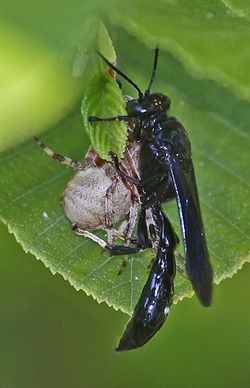Trypoxylon politum
| Organ-pipe mud dauber | |
|---|---|
 |
|
| Pipe Organ Mud Dauber with a spider, Woodbridge, Virginia | |
| Scientific classification | |
| Kingdom: | Animalia |
| Phylum: | Arthropoda |
| Class: | Insecta |
| Order: | Hymenoptera |
| Family: | Crabronidae |
| Genus: | Trypoxylon |
| Species: | T. politum |
| Binomial name | |
|
Trypoxylon politum Drury, 1773 |
|
The organ pipe mud dauber (Trypoxylon politum) is a type of wasp in the family Crabronidae. They are fairly large wasps, shiny black with pale hind tarsi. Male organ pipe mud daubers are among the few male wasps of any species to stay at the nest. A male "stands guard" (to prevent theft of prey or nest materials, as well as to ward off parasites) while a female is away collecting spiders. Mating typically occurs on her visits to the nest. They typically build their nests in sheltered locations, and large aggregations may form with dozens to hundreds of nests in a small area.
Organ pipe mud daubers are also an exceedingly docile species of wasp, and generally pleasant to have around, as they serve to keep spider populations down. They sting the spiders, commonly orb weavers, to paralyze them then deposit them into nests as food for the growing larva. Stings to humans are very rare, bordering on non-existent. However, if squeezed, organ pipe mud daubers will sting in self-defense. There are a great many other species in the genus Trypoxylon (over 700 worldwide), mostly smaller in size and less abundant.
New organ pipe wasp nest showing different muds gathered at different places
An organ pipe wasp gathering mud in South Carolina
Paralyzed spiders taken from a cell in an organ pipe wasp nest
Trypoxylon figulus. A Palearctic species.
An organ-pipe mud dauber adding to her nest in Virginia
...
Wikipedia
